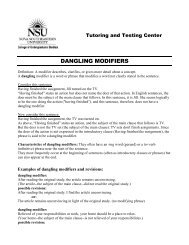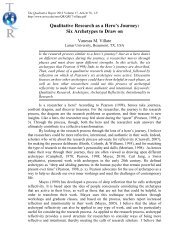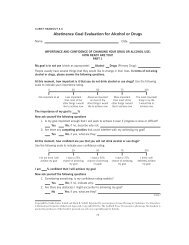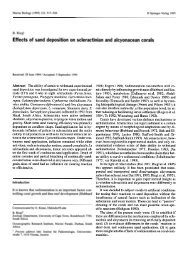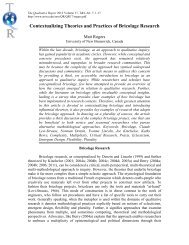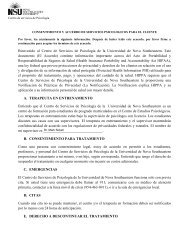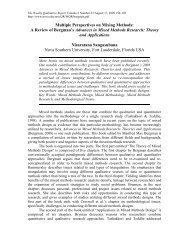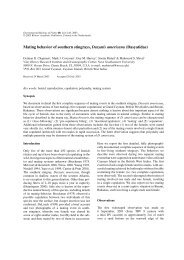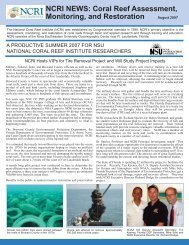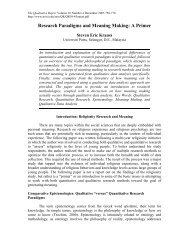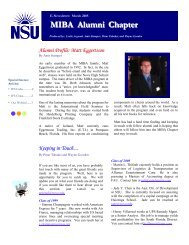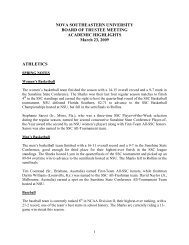Can We Bulk up - Nova Southeastern University
Can We Bulk up - Nova Southeastern University
Can We Bulk up - Nova Southeastern University
You also want an ePaper? Increase the reach of your titles
YUMPU automatically turns print PDFs into web optimized ePapers that Google loves.
Occ<strong>up</strong>ational<br />
dimensions of wellness<br />
Last year, I wrote an article for <strong>We</strong>llness Made Simple<br />
about being happy. I suggested that happiness is not a<br />
destination, but a journey to enjoy along the way.<br />
As an adjunct faculty member in the Department<br />
of Family Therapy at <strong>Nova</strong> <strong>Southeastern</strong> <strong>University</strong>’s<br />
Graduate School of Humanities and Social Science,<br />
I am always fascinated by the way people think about<br />
happiness. So this year, I toured around campus to<br />
find out what happiness means to different people<br />
at different stages in life<br />
My journey put me in contact with people working<br />
at all levels in our university, from the Office of the<br />
President to NSU's students and places in between.<br />
At the top of the NSU ladder is George L. Hanbury II, Ph.D., president of NSU, who is in charge of an organization<br />
with nearly 29,000 students and 4,000 employees. He shared my notion of making a decision to be happy. “Happiness<br />
is a state of mind that does not come about by happenstance,” Hanbury said. He believes that achieving happiness<br />
requires creating a plan for what you want and enjoying the benefits of the journey as you work toward achieving it.<br />
“It takes time, and to carry out that plan, people must be mindful of what they must do to accomplish their<br />
goals,” Hanbury said. He pointed out the importance of establishing priorities, which requires self-discipline and<br />
balance. “You’ve got to be your own personal trainer, and keep going at it with perseverance and integrity,” he said.<br />
22<br />
wellness<br />
made simple<br />
The many<br />
levels of<br />
Happiness<br />
By Randy Heller, Ph.D., LMFT, LMHC<br />
From the beginning of my academic career at NSU’s<br />
Graduate School of Humanities and Social Sciences<br />
(SHSS), I have been struck by the way Honggang Yang,<br />
Ph.D., SHSS dean, smiles every time we cross paths. To<br />
me, his smile conveys a simple message: I am happy<br />
to see you and happy to be here; I am a happy man.<br />
I was curious about what it is that he does to create<br />
that happiness.<br />
Yang is a Chinese American who grew <strong>up</strong> in China before<br />
coming to the U.S. in 1986. He brought his Eastern<br />
philosophy of life and work here to NSU. For him,<br />
happiness is not about any one thing or person.<br />
“Happiness is about defining oneself in interrelationships<br />
with family, friends, peers, colleagues, and the<br />
environment,” Yang said. “Happiness is relational<br />
and is a complex idea that varies across cultures. It is<br />
subjective, and individually defined.”<br />
He believes happiness is fluid and changes in time and<br />
space. For example, some people may feel happier<br />
in the morning because they are morning people, or<br />
others may feel happier being outdoors. Yang implied<br />
that people can change their state of mind or physical<br />
location to be happy.<br />
Tammy Graham, an assistant at the Department of<br />
Multidisciplinary Studies at SHSS, is another person<br />
who has a perpetual smile that brightens the halls of<br />
the Maltz Psychology Building at NSU. When I asked<br />
her about her understanding of happiness, she said, “I<br />
am basically a happy person because negativity doesn’t<br />
accomplish anything. I don’t think about the fact that I<br />
go around with a smile on my face. It’s just there.”<br />
Graham said that when things get tense she giggles,<br />
which allows her to refocus on the fact that she’ll get<br />
through it. “It’s rare that your whole world falls apart at<br />
once,” she said. “If you focus on the positive, you don’t<br />
spiral down.” After facing illness and the loss of her<br />
husband a few years ago, Graham decided that life is<br />
uncertain and tomorrow is not a guarantee, so why be<br />
unhappy if today could be your last?<br />
…achieving happiness<br />
requires creating a plan for what you<br />
want and enjoying the benefits of the<br />
journey as you work toward achieving it.<br />
George L. Hanbury II, Ph.D.<br />
Her philosophy definitely applies to students. Being<br />
a successful student is a rigorous process. Many<br />
students experience challenges managing the demands<br />
of academia and other areas of their professional and<br />
personal lives. Some students have suggested they will<br />
be happier when it is over, and they have their degrees.<br />
I invite them to consider developing a strategy that will<br />
enable them to enjoy the process instead of postponing<br />
their joy until they reach their goal.<br />
As you can see, happiness is pervasive on many levels.<br />
So next time you feel down, learn from the examples<br />
of others, and cheer yourself <strong>up</strong> by doing something<br />
different to bring happiness to your life.<br />
23



